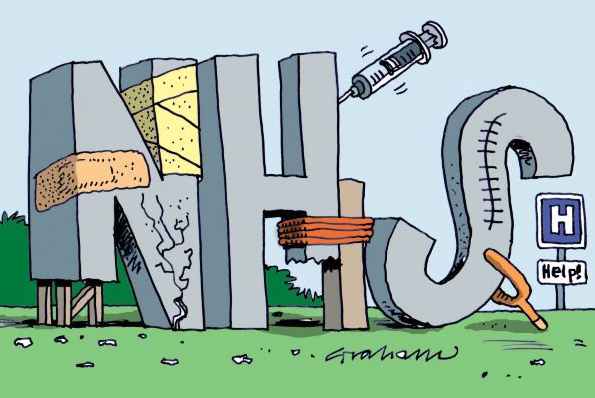
She correctly identifies these abuses as not representing all nurses, but she is not prepared to dismiss it as 'just a tiny minority', as the 'defend-the-NHS-at-all-costs' groups do. She is brave enough to look at the figures and see that this abuse represents a failure of nursing at an institutional level, and a failure to deal with it in the past. The article is well worth reading in its entirety, but she identifies a link between the structure of the NHS and these abuses towards the end of the article,
One of the problems is that the NHS is a monopoly — any patient knows there is nowhere else to be treated and any nurse or doctor brave enough to blow the whistle runs the risk of never working in medicine again; there is no alternative to the state medical monolith. Perversely, it is only for whistle-blowing that NHS staff are punished or dismissed; otherwise there seem to be no sanctions for bad practice. The unions have seen to that.I completely agree with her in this analysis, and I would go a bit further. The problem ultimately with the NHS is that due to its nationalisation and its monopoly, patients are treated not as customers but as burdens on the system. We are constantly told that our coverage is 'free', which is not true, but the attitude that patients are getting something for nothing is what makes the NHS so popular, yet also what contributes to the abuse and poor care we have seen. When the patient is not seen as a customer in a competitive environment (and therefore someone who is welcomed and whose business is welcomed), but as a burden being given a handout, this attitude infiltrates every part of the system. Therefore we see low expectations from patients ("Without the NHS I wouldn't have been given the medicine needed to cure my illness" gushes the Twitter site in support of the NHS) who are convinced they are getting something for nothing and so should be grateful for whatever the NHS gods deign to give them in their infinite kindness. We have also seen this attitude filter to some nurses who do not see their patients as customers who deserve the very best, but instead as burdensome problems who get in the way. Tragically, this is then reflected in the care given to the very weakest in our society.
Yet, Marrin notices that these problems have not been properly confronted, and asks "Is there no-one bold enough to do something?" The unfortunate answer on the political front seems to be 'Not really.' The very silly reaction to Daniel Hannan's incisive points about the NHS on American television l
 ast month shows just how much the subject of NHS reform has become a total 'no-no' in all of the political parties, including the Conservative Party and its leader. Cameron and Brown both realise that there are a lot of votes in supporting the NHS, and both are trying to paint themselves as 'the party of the NHS' and the other as 'anti-NHS', meaning that any suggestion of significant reform is hysterically shouted down as extremist or 'eccentric' (as David Cameron described Hannan's comments last week.)
ast month shows just how much the subject of NHS reform has become a total 'no-no' in all of the political parties, including the Conservative Party and its leader. Cameron and Brown both realise that there are a lot of votes in supporting the NHS, and both are trying to paint themselves as 'the party of the NHS' and the other as 'anti-NHS', meaning that any suggestion of significant reform is hysterically shouted down as extremist or 'eccentric' (as David Cameron described Hannan's comments last week.)The fact of the matter is that the NHS is by no means perfect. It is not the worst system in the world, and there is a lot to recommend it, but the idea that we live in some sort of healthcare paradise where everyone is given high quality care for very little cost is simply false. Marrin correctly identifies that structural debate about the NHS is vital. Unfortunately, a political atmosphere where we must support every part of the NHS, and the unchecked funding of it at all costs, lest we be labelled 'against our doctors and nurses' and 'unpatriotic' means that such debate will quickly be stifled.
No comments:
Post a Comment